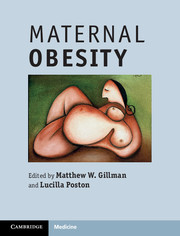Book contents
- Frontmatter
- Contents
- Contributors
- Preface
- Section 1 Trends and determinants of obesity in women of reproductive age
- Section 2 Pregnancy outcome
- Section 3 Long-term consequences
- Section 4 Interventions
- 14 Intervention strategies to improve outcome in obese pregnancies: focus on gestational weight gain
- 15 Interventional strategies to improve outcome in obese pregnancies: insulin resistance and gestational diabetes
- 16 Intervention strategies to improve outcome in obese pregnancies: micronutrients and dietary supplements
- 17 Pre-pregnancy bariatric surgery: improved fertility and pregnancy outcome?
- Section 5 Management and policy
- Index
- Plate Section
- References
17 - Pre-pregnancy bariatric surgery: improved fertility and pregnancy outcome?
from Section 4 - Interventions
Published online by Cambridge University Press: 05 August 2012
- Frontmatter
- Contents
- Contributors
- Preface
- Section 1 Trends and determinants of obesity in women of reproductive age
- Section 2 Pregnancy outcome
- Section 3 Long-term consequences
- Section 4 Interventions
- 14 Intervention strategies to improve outcome in obese pregnancies: focus on gestational weight gain
- 15 Interventional strategies to improve outcome in obese pregnancies: insulin resistance and gestational diabetes
- 16 Intervention strategies to improve outcome in obese pregnancies: micronutrients and dietary supplements
- 17 Pre-pregnancy bariatric surgery: improved fertility and pregnancy outcome?
- Section 5 Management and policy
- Index
- Plate Section
- References
Summary
Introduction
Ideally interventions to improve pregnancy outcome in obese women should start in the preconceptional period. Lifestyle changes leading toward a negative energy balance (energy intake < energy expenditure) and consequently to weight loss are advisable as a first step. However, the effectiveness of these lifestyle interventions in non-pregnant adults to maintain the induced weight loss in the long term is low, even if these conventional actions are supported by pharmacotherapy. In relation to morbid obesity, bariatric surgery, also known as obesity surgery, offers a more effective treatment: it results in a substantial weight loss that is sustainable in the long term and in improvement of obesity-associated co-morbidities [1,2]. A surgical intervention is therefore increasingly being considered when conventional interventions have failed in patients with a body mass index (BMI) of more than 40kg/m² and for those with a BMI of over 35kg/m² with co-morbidities such as sleep apnea, diabetes, joint disease, and cardiopulmonary problems [3].
As obesity rates rise worldwide, so have the number of bariatric operations and in the number of practicing bariatric surgeons [4,5]. In 2008 approximately 220000 people with morbid obesity underwent bariatric surgery in the USA and Canada [6]. About 85% of all bariatric surgery patients are women of reproductive age [5]. Additionally, an increasing number of adolescents, predominantly female, are having bariatric surgery [7]. Consequently, health care providers will increasingly be confronted with pregnant women with a medical history of bariatric surgery.
Keywords
- Type
- Chapter
- Information
- Maternal Obesity , pp. 209 - 222Publisher: Cambridge University PressPrint publication year: 2012
References
- 1
- Cited by

